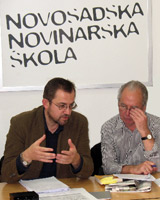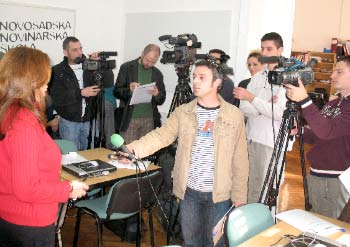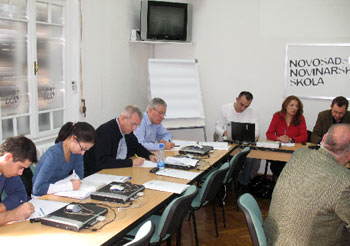Future of Serbia Press Council discussed at UNESCO roundtable
09-12-2009 (Novi Sad)

Participants of the roundtable
© UNESCO
The role of the new Press Council of Serbia and the media self-regulation in the country were among the items discussed during the roundtable organized by UNESCO in Novi Sad on 19 November. The event was prepared in collaboration with the Novi Sad School of Journalism and OSCE, as part of the UNESCO project, Alignment to International Standards in the Media Sector of South East European Countries.
The roundtable, which was organized under the theme “Press Council of Serbia: What is Stopping?”, gathered fifty participants from different media and organizations. Since the Serbia Press Council had been established a few days before, the participants discussed its future and jurisdiction. Speakers included Nadezda Gace, President of Independent Journalism Association of Serbia; Vladan Filipcev, President of the Board of Directors of Associations of Local Print Media; Rade Veljanovski, Professor of journalism. Two international speakers also attended the event: Ognian Zlatev, UNESCO consultant and Director of the Media Development Center in Sofia (Bulgaria); and Ian Mayes, former ombudsperson in the British daily The Guardian.
The participants stressed that the methods of financing are very important for the future independence of the Press Council. According to Nadezda Gace, the question of long-term financing was still not solved, but the first two years of Council’s work will be sponsored by the Press Council of Norway. Media industry will appoint four members for the Board of Directors, the same number of members will be appointed by media associations. Three more members will be chosen as public representatives.
Ognjan Zlatev said that the organization and structure of the 32 Press Councils currently existing in Europe varied from country to country. Bulgaria needed 15 years to establish a press council. But he is sure that press councils are the best and cheapest way of solving conflicts between media and public. Ian Mayes focused on the role of in-house ombudsman media systems.
The roundtable in Novi Sad was part of the series of national events organized by UNESCO in order to initiate the process of establishing self-regulatory and newsroom ombudsman mechanisms in each targeted country. The whole programme is financed by the European Union.
The participants stressed that the methods of financing are very important for the future independence of the Press Council. According to Nadezda Gace, the question of long-term financing was still not solved, but the first two years of Council’s work will be sponsored by the Press Council of Norway. Media industry will appoint four members for the Board of Directors, the same number of members will be appointed by media associations. Three more members will be chosen as public representatives.
Ognjan Zlatev said that the organization and structure of the 32 Press Councils currently existing in Europe varied from country to country. Bulgaria needed 15 years to establish a press council. But he is sure that press councils are the best and cheapest way of solving conflicts between media and public. Ian Mayes focused on the role of in-house ombudsman media systems.
The roundtable in Novi Sad was part of the series of national events organized by UNESCO in order to initiate the process of establishing self-regulatory and newsroom ombudsman mechanisms in each targeted country. The whole programme is financed by the European Union.
 Local media interviewing participants of the roundtable
Local media interviewing participants of the roundtable© UNESCO
 During the roundtable
During the roundtable© UNESCO
Related themes/countries
· Serbia
· Professional Journalistic Standards and Code of Ethics
Share this story:
Contact information
- UNESCO
Source














